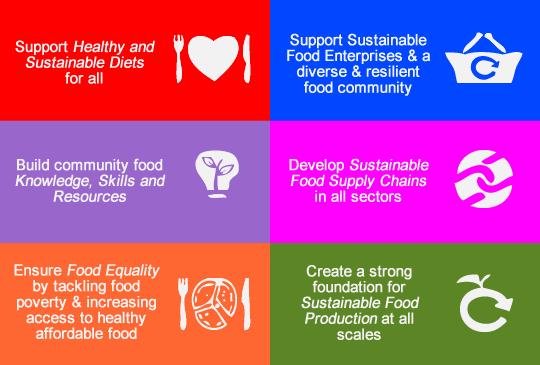
Developing a Food Charter for Greater Manchester
Held on the On 24 April 2014, the ‘Feeding Manchester’ meeting was a social event, designed to celebrate the launch of the freshly created document, Sustainable Food for a Greater Manchester, a publication that resulted from the work of over one hundred community groups, charities, small businesses and public sector partners.
The event was organised by the Kindling Trust, a social enterprise that follows its core guiding principles to be a catalyst for social change and to promote ecological sustainability, local resilience, justice and social cohesion. The Kindling Trust founded the Feeding Manchester project in 2009, with the intention of creating partnerships and implementing new ways to overcome some of the challenges that face Manchester and its efforts to create a more stable food system for the future.
Around 50 people came along to join in the celebration, sample the odd pint of ale and share a selection of nibbles, provided by Unicorn Grocery - a co-operative wholefood outlet based in South Manchester. The atmosphere was relaxed and welcoming and everyone there was keen to talk about their various projects and initiatives, and to share a wealth of experiences and knowledge. The meeting involved sustainable food practitioners from a diverse range of organisations, whose presence reflected a growing commitment to increasing the resilience of the local food system in Greater Manchester.
Sustainable Food for a Greater Manchester is an action plan that highlights key recommendations to ensure that Greater Manchester can be transformed into a sustainable food city. At the core of the document are six key areas of work:

The document details a variety of mechanisms though which these goals can be achieved, such as raising public awareness of healthy eating and improving food knowledge in Manchester by developing community campaigns, and engaging school children by adding food education to the curriculum at an early stage.
Inspiring the public and encouraging people to be more involved in the production of the food that they eat and more active in their food choices seems to be a key area across the sustainable food movement. Food is something we can all get excited about if we are given the opportunity, the education and the access. It is universal in its appeal and can be a unifying topic as well as a divisive one and, as such, is an ideal subject for public engagement.
In the tradition of policy making, progress is often made by categorising and condensing large, complex areas into manageable bite-sized pieces so that regulation can be implemented in a piecemeal fashion. However, the breadth of issues raised in the charter illustrates the need for a more holistic approach to food policy.
For instance, a key focus for developing a sustainable food city must be education. However in areas of Manchester that suffer high levels of deprivation, applying the deficit model alone and producing a "better-informed" public, stands very little chance of making an impact. There are still parts of Manchester where residents have little or no access to fresh, healthy food. In areas affected by food poverty, people can be left with very little freedom of choice regarding the food that they buy. Equipping the community with skills and knowledge regarding sustainable food is vital, but without also addressing a myriad of other considerations such as access to food, people will not be able to make different choices.
A message that resonates strongly through the strategy is that these actions must strive to involve the whole community and that the intended changes cannot be made without an integrated and collaborative approach:
“No one organisation can achieve all of the aims of this ambitious strategy … We can support each other to work towards some of the aims, and work together to push for them all. This is just the start – a foundation to build on and act on to transform Greater Manchester into a Sustainable Food City.”
Good food should not be for the privileged few; it should be available to everyone. This is why it is good news that within the charter, we have a strategy dedicated to improving the food system in Manchester as a whole. It is a step towards ensuring that we are all equipped with both the motivation and the ability to make real changes for the better.
The next Feeding Manchester event will focus on Food Poverty & Equality with speakers from across the country; this event will take place in mid-September. More information on this forthcoming event, and the food charter, can be found by visiting the Kindling Trust website.
Main photograph used courtesy of Marek Isalski.
Contributor Profile
Rebecca St. Clair is a PhD student at the University of Salford.
She is currently working closely with the Real Food Wythenshawe team to investigate the value of urban food, under the supervision of Dr Michael Hardman.
Rebecca has spent the past year volunteering for food and environmental charities in London, following the completion of her MSc in the History of Science, Medicine and Technology at Imperial College, London.

